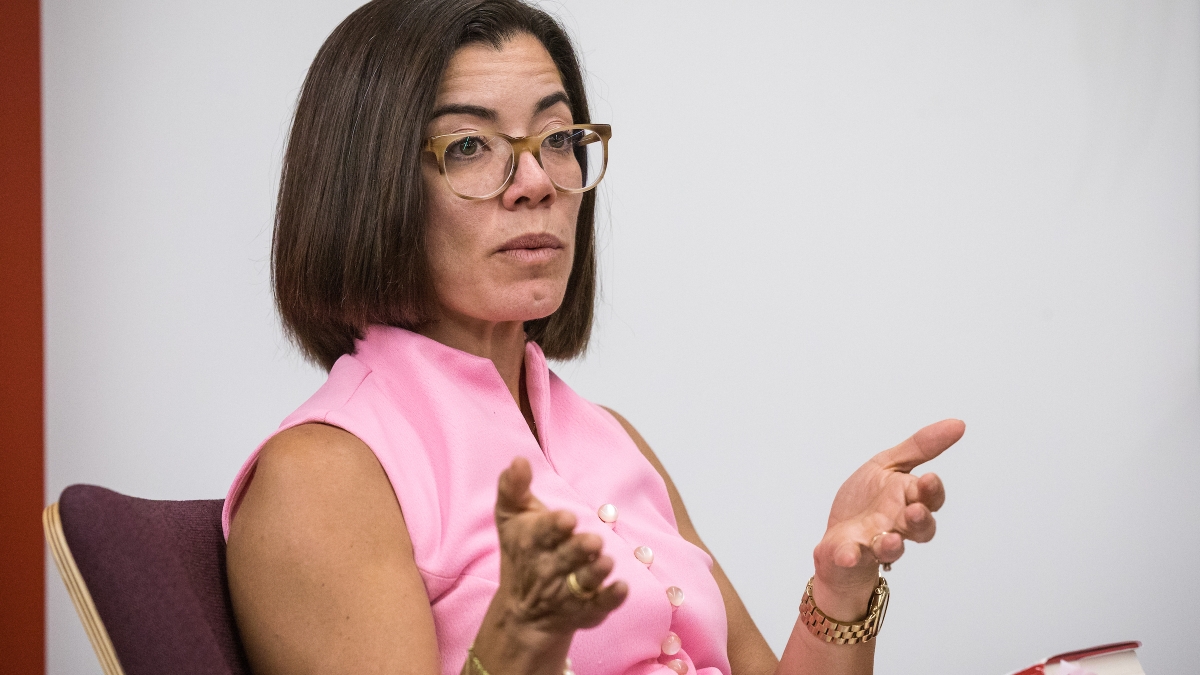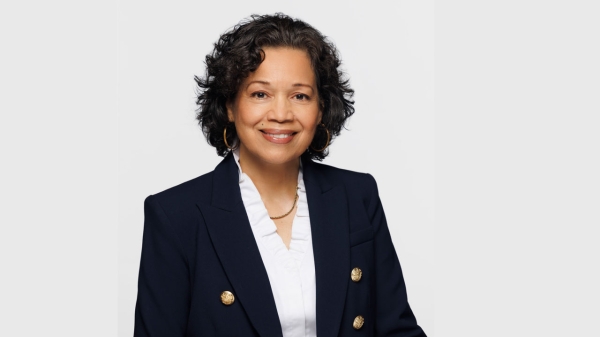COVID-19 pandemic taught ASU journalism students important lesson: Flexibility
Professor of Practice Fernanda Santos says adaptability will serve reporters well, whether they're in a pandemic or not

Former New York Times journalist Fernanda Santos (pictured at a 2017 event at the Downtown Phoenix campus) is a Southwest Borderlands Initiative professor of practice at ASU's Walter Cronkite School of Journalism and Mass Communication. Photo by Charlie Leight/ASU Now
Adaptability is a crucial skill for journalists, and students at the Walter Cronkite School of Journalism and Mass Communication got a crash course this spring when Arizona State University pivoted to remote learning because of the COVID-19 pandemic.
Fernanda Santos, the Southwest Borderlands Initiative professor of practice who teaches narrative journalism and bilingual reporting, saw it as an opportunity. She had begun a project with her students at the start of the semester known as “What do Dreamers want for 2020?”
Though stay-at-home orders made things a bit more complicated, she and her students were able to find new angles and new techniques to tell their stories. The final package was a success, with a mix of video, profiles and an in-depth story about immigrants being labeled as essential workers, but who can also lose everything they worked for by being deported if the program ends.
Here, she shares why resilience is an important workplace skill for students to master.
Answers have been edited for clarity and length.
Question: How did you help students stay connected and motivated during the change to remote learning?
Answer: I’ve had one-on-one meetings with several of my students just to chat and find out what’s going on.
Another thing was, how can I teach or what can I teach my students about reporting that can be done when they can’t go out and interview people face to face? I started thinking about my own life and my own experience with my family in another country. I adapted a lot of the things that I already used to my classes or have suggested that my students use them. For example, Zoom interviews. You have the video recording, you have the audio recording. So if you’re doing a video piece you can have the footage. If you’re doing a digital story, you have the words that are there registered to make sure you got everything right.
Q: What might be a silver lining to learning to adapt to these challenges?
A: What journalism students are learning right now is a skill that’s going to be helpful in the future, whether or not you’re stuck at home. The fact that journalism students at Cronkite are now having the opportunity to use these skills in college means that when they are faced with a story that they cannot get to right away, they won’t be paralyzed. I think that this is going to create a generation of journalism students who are more equipped to deal with all the different stories that we have to do these days.
Q: How important is flexibility?
A: One of the most important lessons that I have learned in life is you have to be adaptable. That means that when faced with a challenge, find a way to adapt and then overcome the challenge. That is what students are doing at the Cronkite School. They are learning to overcome the challenge of not being able to leave their homes to go to class and interview people. If you use the skill for everything else in life, you will not only become a better professional, but also a better person because it’s the people that could quickly adapt to new situations who are the ones who usually succeed.
Journalism is not a static profession. Journalism changes from the moment you leave your house, to the moment you get to the interview — the story may have already changed. So if you cannot adapt to things without being so rattled, then you won’t be able to be a very good journalist. Now if you’re capable of getting to this interview realizing it’s now a different story than the one you thought it was, be a little upset. Then, take a deep breath, switch gears and report this new story. You will be optimally prepared to do well in any job that you do as a journalist. That’s just a skill for journalism that comes in really handy in general.
Q: You had a lot of plans to produce this content with your students. How were you still able to come up with the finished product?
A: My students are amazing. If my students had not rolled up their sleeves and decided, “We're going to get it done,” it wouldn’t have mattered what I said. I needed the cooperation of the students. Now, we had to adapt certain things. For example, we had discussed a Q&A with an immigration lawyer. Once the Zoom platform became available, I thought, “Well, I can now invite an immigration lawyer to our Zoom classroom.”
We discussed from the beginning, “What do Dreamers want for 2020?” Because I have very industrious students, they didn’t stop when spring break started, and they took advantage of an event that happened to happen on the day before everything closed. It was just by sheer luck, but you know luck only comes to people who work hard. If the students were sitting at home waiting for luck to strike, your winning lottery ticket to fall on your lap, you would have never won the lottery. You have to put in the work. Once the video was in, then the challenge became, well, how do we edit a video and put a video together with students who are each in a separate house and edit bays that are not available?
Ultimately the answer is my students were not afraid to do things a little differently. It goes back to adapting. We all had to adapt. It wasn’t easy for me. It wasn’t easy for any of the students, but we got through it together and in the end I was looking at the work that was done and I thought, “Wow! Nobody would have ever said that this was entirely done with students at home and me in my home.”
Q: How did you stay committed to tell the story that you started off with at the beginning of the semester?
A: I think it became more important than ever. We started this semester thinking about undocumented immigrants who had DACA, and others who could not apply for DACA because the program is no longer taking new applications. We focused on them because at some point the Supreme Court is supposed to have an opinion about the decision by the Trump administration to end the DACA program. When you throw coronavirus in the mix, now you have a group of immigrants who are facing the possibility of deportation — those are the DACA recipients, but are also working to improve the lives of communities that are under quarantine.
So I thought, what an amazing opportunity to showcase the work that DACA recipients are doing and the irony that they are called essential workers on one hand, but could also lose everything they have worked to build on the other hand if the Supreme Court rules in favor of the Trump administration. This is where the best stories exist. It’s exactly when things get complicated that you have to take a step back and say, “OK, let me look at this ... how can I change my original idea and adapt it to the current times?” — and that’s what we did.
I just am one of those people who believe that there’s always a way out, and I want my students to always believe in that. So I thought if I give up, what kind of lesson am I giving my students? That when faced with a challenge just give up? No! That when faced with a challenge you put your big-girl pants on and you go out there and you get the job done! I started off the semester knowing about the Supreme Court and that was our focus, but then this thing came and I said, “OK, well, it impacts everybody. So if it impacts everybody, it impacts the same people we were following already.”
Q: Any other advice for anyone who is struggling to adjust to the coronavirus situation?
A: I think the most important thing to remember is that this is not going to be forever, but what you learn as you go through this will impact the rest of your life. Look at the opportunities to learn. Find the lessons even when things seem to be going wrong all the time, and remember that if you look at your challenges as opportunities you will be better prepared to deal with whatever comes your way.
Written by Cronkite School student Sthefany Rosales.
More Law, journalism and politics

CBS News president to give keynote address at Cronkite School’s spring convocation
Ingrid Ciprián-Matthews, president of CBS News, will serve as the keynote speaker at Arizona State University’s Walter Cronkite…

School of Politics and Global Studies director's new book explores mass violence
Why do people commit atrocities and why are certain groups, including religious and ethnic, more vulnerable to large-scale…

ASU faculty contributing to improvement of Wikipedia
Many academics have a love-hate relationship with Wikipedia. While the website has information about almost anything you can…